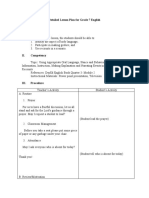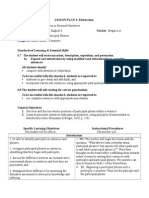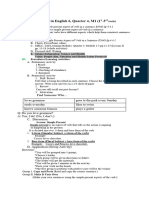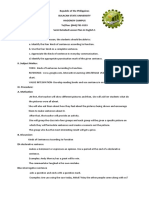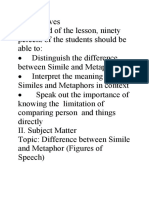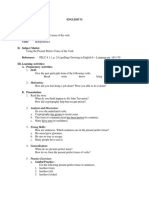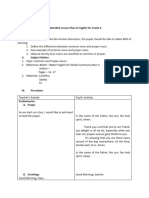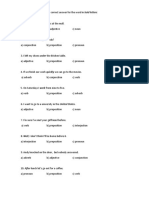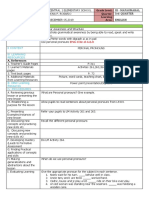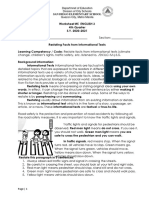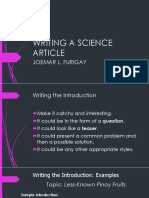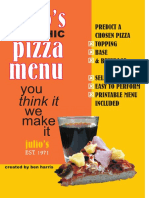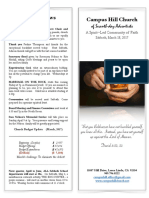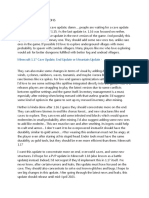Activity For Subordinating Conjunction
Activity For Subordinating Conjunction
Uploaded by
jackelyn jamonCopyright:
Available Formats
Activity For Subordinating Conjunction
Activity For Subordinating Conjunction
Uploaded by
jackelyn jamonOriginal Title
Copyright
Available Formats
Share this document
Did you find this document useful?
Is this content inappropriate?
Copyright:
Available Formats
Activity For Subordinating Conjunction
Activity For Subordinating Conjunction
Uploaded by
jackelyn jamonCopyright:
Available Formats
Read along silently as your teacher reads the story.
A Surprise for Me
by Michelle B. Balatbat
As soon as I opened my eyes that beautiful Saturday morning, Papa told me that I should get ready for he’s got a
surprise for me! Though I still feel like staying in bed for I am still sleepy, I knew it was something I’ll definitely enjoy!
Just as I finished preparing myself up, Mom came up and told me to hurry up.
Once we got to the car, Papa told me that I would definitely enjoy where we are going! I’m feeling all the excitement
and once we parked into this unfamiliar garage I wonder, whose house that was? Until we knocked on the door, I kept
trying to make guesses of who’s house could that be? And just as the door opens, I heard a familiar voice!
“Come in, come in!” says that lovely voice.
It’s grandma! While I was jumping up and down Grandma showed up with a wonderful smile! As soon as I saw her, my
heart felt so happy. It’s been a long time since I’ve seen her and this is such a wonderful surprise! Even though the house
is quite old, it felt so comfortable and welcoming. While they were preparing for lunch, I went to Papa and whispered,
“Thank you for this surprise Papa! I really missed, Gradma!”
“You’re welcome, my son. Whenever you want to visit her just tell me and I’ll bring you here.”
Answer these questions:
Why did the boy wake up early?
Where did they drive to see the surprise?
Do you think he had fun with that surprise? Explain your answer.
Look at the underlined words used in the story.
just as although while though once even though
as soon as until whenever
These words are called conjunctions known as subordinating conjunctions. These are also joining words used to join
two words, phrases and clauses to make one long sentence.
Common Subordinating Conjunctions
Conjunctions can bring different flavors of meaning to writing, building into the resulting sentence the relationship
between the main and subordinate clause. There are five main classes of conjunctions, based on the type of meaning
they convey.
Time-related conjunctions establish a period when the main clause will be performed. These include after, as
soon as, as long as, before, once, still, until, when, whenever, and while. For example, "I will do the
dishes after everyone has gone home" might be said by a hostess who prefers to enjoy her guests while they are
there.
Concession and comparison conjunctions redefine the main clause in the context of the process being delivered.
Concession conjunctions include although, as though, and even though. "Eliza wrote the Higgins report, even
though it was assigned to Colonel Pickering." Comparison conjunctions include just as, though, whereas, in
contrast to, and while: "Ellen v-logged about the results of the political meeting, in contrast to her arch-enemy
who merely blogged."
Cause conjunctions illuminate the reason that the main clause activities were performed and are commonly
engineered by using as, because, in order that, since, and so that. "Grant dreamed about cheese because he had
eaten so much of it the night before."
Condition conjunctions set the rules under which the main clause will be performed and are indicated by even if,
if, in case, provided that, and unless. "Unless it rains on Saturday, we will have the picnic in the park." Note that
subordinate clauses can come first in a sentence, but they're still subordinate because without the main point
they can't exist.
Place conjunctions determine where activities might occur and are primarily where, wherever, and whereas. "I
will place my conjunction in the sentence wherever I please."
Putting the Subordinator First
"We'll have a picnic on Saturday" is an independent clause that can be modified by the dependent clause "it rains" using
the conjunction "unless." But when we risked a picnic on Saturday's sunniness, we put the conjunction in front of a
sentence: It rains on Saturday. Putting a subordinate conjunction (unless) in front of that sentence makes it dependent,
and now requires a main clause to support it: "we'll have a picnic."
Putting the subordinate clause first can have interesting or even witty results. In his play "The Importance of Being
Earnest," Oscar Wilde commented on the way people speak effusively when they are madly in love. Gwendolyn says to
Jack, "If you are not too long, I will wait here for you all my life."
The 20th-century humorist Robert Benchley wrote, "After an author has been dead for some time, it becomes
increasingly difficult for his publishers to get a new book out of him each year." Because Benchley put the conjunction
and its subordinate clause first, he made the line funnier by delaying the effect.
Let’s Do This
The following exercises will help you gain greater understanding about how subordinating conjunctions work. Choose
the best answer to complete each sentence.
1. _________ the basement flooded, we spent all day cleaning up. ( After, Although, Before, Even if)
2. I don’t want to go to the movies _____________ I hate the smell of popcorn. ( although, because, whenever, so that)
3. I paid Larry, ___________ garden design work is top-notch. ( whenever, whose, after, if)
4. ___________ spring arrives, we have to be prepared for more snow. ( Because, Until, Although, Now that)
5. _____________ the alarm goes off, I hit the snooze button. ( As soon as, Because, Before, Now that)
Let’s Remember This
Subordinating conjunctions joins a subordinate clause to a main clause
A subordinate clause cannot exist alone as a single sentence because it depends on a main clause for its meaning.
They often show comparison, a reason, a purpose, time, or place.
Let’s Test Ourselves
The sentences below either have subordinating clause or a coordinating clause. Circle the conjunction used in each
sentence, then write CC if it is Coordinating Conjunction and SC if it is Subordinating Conjunction.
1. James picked the dinner, and Nadine picked the dessert.
2. Malia laughed when the puppy chased its tail.
3. The lion limped as it crept through the jungle.
4. Because it began to rain, the game was called off.
5. I called Alyana, but she didn’t answer.
6. If the door is open, you should close it.
7. It was a good movie, yet no one saw it.
8. Whenever Anne is ready, we all leave.
9. The class picnic will be at the beach, or it will be at the zoo.
10. The campers stopped to rest although they were in a hurry.
You might also like
- This Is Our Place ExcerptDocument29 pagesThis Is Our Place ExcerptI Read YA100% (1)
- Simile and Metaphor Lesson Plan Grades 4-6Document2 pagesSimile and Metaphor Lesson Plan Grades 4-6api-368414593No ratings yet
- ThroneOfNight Book1Document112 pagesThroneOfNight Book1Dan Smith100% (3)
- Soup QuestionnaireDocument2 pagesSoup Questionnairehussainhayat9100% (1)
- Reptile GodDocument69 pagesReptile GodBoris Preis100% (7)
- Semi-Detailed Lesson Plan in English 7 DECEMBER 9, 2019 I. ObjectivesDocument2 pagesSemi-Detailed Lesson Plan in English 7 DECEMBER 9, 2019 I. ObjectivesEljien LumbayoNo ratings yet
- Demo Teaching 1Document6 pagesDemo Teaching 1Ernani Moveda FlorendoNo ratings yet
- Reading Lesson Plan - Reading With ExpressionDocument4 pagesReading Lesson Plan - Reading With Expressionapi-256866880100% (1)
- Module 2 Day 3 DLPDocument9 pagesModule 2 Day 3 DLPArian Joy BautoNo ratings yet
- Lesson Exemplar in English - 6Document3 pagesLesson Exemplar in English - 6Reynold TanlangitNo ratings yet
- Lesson Plan 3Document13 pagesLesson Plan 3api-299903357No ratings yet
- ReviewDocument303 pagesReviewTrixy Manago100% (1)
- Lesson Plan - Figures of Speech (Simile, Metaphor, Personification)Document6 pagesLesson Plan - Figures of Speech (Simile, Metaphor, Personification)Judith DacuaNo ratings yet
- LP For Perfect TenseDocument2 pagesLP For Perfect TenseKareen Oclarit50% (2)
- Detailed Lesson Plan in EnglishDocument10 pagesDetailed Lesson Plan in EnglishRoy CaburnayNo ratings yet
- DLP Verb Feb.Document5 pagesDLP Verb Feb.Ariane del RosarioNo ratings yet
- This Study Resource Was: Opinion-Marking Signals Correct Sounds English/ Stress, Pitch & JunctureDocument6 pagesThis Study Resource Was: Opinion-Marking Signals Correct Sounds English/ Stress, Pitch & JunctureColeen Gorospe Battung100% (1)
- Lesson Plan Simple Present Grade 6 q4Document2 pagesLesson Plan Simple Present Grade 6 q4Judessa De la CruzNo ratings yet
- Detailed Lesson Plan in English V by Prema Magale PacoDocument11 pagesDetailed Lesson Plan in English V by Prema Magale PacoMhiss JBNo ratings yet
- DLP For Cot 1 1Document5 pagesDLP For Cot 1 1IanNo ratings yet
- "Concrete, Abstract and Collective Nouns": Reading: Writing: Speaking: ListeningDocument4 pages"Concrete, Abstract and Collective Nouns": Reading: Writing: Speaking: ListeningHoney Let PanganibanNo ratings yet
- Republic of The Philippines Bulacan State University Hagonoy Campus Tel/Fax: (044) 791-0153 Semi Detailed Lesson Plan in English 1 I. ObjectivesDocument3 pagesRepublic of The Philippines Bulacan State University Hagonoy Campus Tel/Fax: (044) 791-0153 Semi Detailed Lesson Plan in English 1 I. ObjectivesAlexa Dela CruzNo ratings yet
- LP Prefix Suffix 1st QuarterDocument2 pagesLP Prefix Suffix 1st QuarterNorhata MizalboNo ratings yet
- LP - Progressive TenseDocument2 pagesLP - Progressive TenseGea Shyne Lachica0% (1)
- Cot 3Document5 pagesCot 3Mary Ann Magnaye100% (1)
- Figures of Speech (DLP)Document19 pagesFigures of Speech (DLP)Pat HortezanoNo ratings yet
- I. Objectives: Semi-Detailed Lesson Plan Prepared by Jezreel Madsa 11-29-17Document4 pagesI. Objectives: Semi-Detailed Lesson Plan Prepared by Jezreel Madsa 11-29-17Amiga MiNo ratings yet
- Demonstrates A Command of The Conventions of Standard English Grammar and Usage When Writing or SpeakingDocument3 pagesDemonstrates A Command of The Conventions of Standard English Grammar and Usage When Writing or SpeakingPatrina Madrona Sarong Guatno100% (1)
- Simple Tenses of The VerbDocument14 pagesSimple Tenses of The VerbJun Rey Prudz-Otare EstdoNo ratings yet
- Detailed LP in English 2Document3 pagesDetailed LP in English 2Krimson Mike DolorzoNo ratings yet
- (EN6G-Ih-3.9) : Use Courteous / Polite ExpressionsDocument6 pages(EN6G-Ih-3.9) : Use Courteous / Polite ExpressionsRussel Beth Pasadas BauyaNo ratings yet
- Grade 6 DLP Q3 English Part 2Document14 pagesGrade 6 DLP Q3 English Part 2Mimi MirabuenoNo ratings yet
- 5es Lesson PlanDocument4 pages5es Lesson PlanFlordelis Blanco LisaoNo ratings yet
- DETAILED LESSON PLAN IN ENGLISH FinalDocument8 pagesDETAILED LESSON PLAN IN ENGLISH FinalMarl Angelo CarreonNo ratings yet
- October 8 BAtu Bela Bertangkup Lpfor ScribDocument3 pagesOctober 8 BAtu Bela Bertangkup Lpfor ScribAida AguilarNo ratings yet
- 4as Lesson Plan in English7Document2 pages4as Lesson Plan in English7Azul, John Eric D.No ratings yet
- Semi - Detailed Lesson PlanDocument3 pagesSemi - Detailed Lesson PlanEd Bryan Juntilla Sabaduquia100% (1)
- Detailed Lesson Plan - CHRISTINE JOY (Discovery of A Father)Document4 pagesDetailed Lesson Plan - CHRISTINE JOY (Discovery of A Father)Christine Joy Guillano CalluengNo ratings yet
- The Foolish Farmer and His CarabaoDocument1 pageThe Foolish Farmer and His Carabaomary grace0% (1)
- Competency No. of Items: En5Rc-Iic-3.2.1Document8 pagesCompetency No. of Items: En5Rc-Iic-3.2.1Mary Abrejal DolorNo ratings yet
- 12 Semi Detailed Lesson Plan and CriticismDocument5 pages12 Semi Detailed Lesson Plan and CriticismCindy EspinoNo ratings yet
- Complete The Following Sentences Using Appropriate Verb FormsDocument5 pagesComplete The Following Sentences Using Appropriate Verb FormsMaycel Vega MarmitoNo ratings yet
- Detailed LP in English Grade 4Document7 pagesDetailed LP in English Grade 4Cristine Mae Tumamao100% (1)
- LP For Demo DegreesDocument10 pagesLP For Demo DegreesAnonymous TvGTyLONo ratings yet
- En6G-Iig-7.3.1 En6G-Iig-7.3.2: Test - Id 32317&title Prepositional PhrasesDocument15 pagesEn6G-Iig-7.3.1 En6G-Iig-7.3.2: Test - Id 32317&title Prepositional PhrasesKenia Jolin Dapito EnriquezNo ratings yet
- Final Lesson Plan RajahDocument4 pagesFinal Lesson Plan RajahDina Valdez0% (1)
- English 6 DLP 6 Words With Affixes SuffixesDocument21 pagesEnglish 6 DLP 6 Words With Affixes SuffixesRonaldo Yabut100% (2)
- Lesson Plan in English7 For DemoDocument3 pagesLesson Plan in English7 For DemoCyn Cyn100% (1)
- DLP TomasDocument13 pagesDLP TomasYasmen MamarintaNo ratings yet
- A Detailed Lesson Plan in English For Grade 4Document9 pagesA Detailed Lesson Plan in English For Grade 4Jeanelee Esquibel BonachitaNo ratings yet
- Lesson Plan in English ViDocument14 pagesLesson Plan in English Vivangie5269No ratings yet
- DLP in ENGLIS2 Expository TextDocument6 pagesDLP in ENGLIS2 Expository TextKhen Lloyd Montes MansuetoNo ratings yet
- Parts of Speech Extra PractivityDocument1 pageParts of Speech Extra PractivityPaulina Monica Escalona MuñozNo ratings yet
- A Detailed Lesson PlanDocument5 pagesA Detailed Lesson PlanCelenie VillarinNo ratings yet
- Semi-Detailed Lesson Plan in English - Grade 8: Instructional ProcedureDocument4 pagesSemi-Detailed Lesson Plan in English - Grade 8: Instructional ProcedureJen ValenciaNo ratings yet
- Cot DLP EnglishDocument2 pagesCot DLP EnglishJona RosarioNo ratings yet
- Tell Why: A Persuasive Writing: Selected Topic EN6WC-Ivb-2.2Document12 pagesTell Why: A Persuasive Writing: Selected Topic EN6WC-Ivb-2.2Maricar MagallanesNo ratings yet
- DLP-May 23-ENGDocument3 pagesDLP-May 23-ENGJoi FainaNo ratings yet
- English 9 - Unit 14 - Lesson 1 - What Are VerbalsDocument20 pagesEnglish 9 - Unit 14 - Lesson 1 - What Are VerbalsMaria Liza CuetoNo ratings yet
- Emeterio-Federica Gerez National High School: Jhs Learning Activity SheetDocument3 pagesEmeterio-Federica Gerez National High School: Jhs Learning Activity SheetChelleyOllitroNo ratings yet
- Lesson 7 - Subordinate ConjunctionsDocument3 pagesLesson 7 - Subordinate ConjunctionsFaisi Gikian0% (1)
- Tarea Ingles PDFDocument3 pagesTarea Ingles PDFlauraNo ratings yet
- Ppt. MELC. Subordinating ConjucntionDocument23 pagesPpt. MELC. Subordinating ConjucntionCzarina SiribanNo ratings yet
- 2021-2022 Data Collection Induction Program For Beginning Teachers (Enhanced Teacher Induction Program)Document1 page2021-2022 Data Collection Induction Program For Beginning Teachers (Enhanced Teacher Induction Program)jackelyn jamonNo ratings yet
- Grade 6 Mapeh Final GradesDocument2 pagesGrade 6 Mapeh Final Gradesjackelyn jamonNo ratings yet
- JAMON 2020 Gabi GO FOODSDocument1 pageJAMON 2020 Gabi GO FOODSjackelyn jamonNo ratings yet
- English3 Q4 W5 WorksheetDocument3 pagesEnglish3 Q4 W5 Worksheetjackelyn jamonNo ratings yet
- Grade 6 Mapeh 1st QuarterDocument54 pagesGrade 6 Mapeh 1st Quarterjackelyn jamonNo ratings yet
- Grade 6 Mapeh 2nd QuarterDocument54 pagesGrade 6 Mapeh 2nd Quarterjackelyn jamonNo ratings yet
- Let's Apply: NAME: - DATE: - RATING/SCOREDocument3 pagesLet's Apply: NAME: - DATE: - RATING/SCOREjackelyn jamonNo ratings yet
- Summative Test in Music 6Document1 pageSummative Test in Music 6jackelyn jamon100% (2)
- DEmo Lesson Plan 1st QuarterDocument3 pagesDEmo Lesson Plan 1st Quarterjackelyn jamonNo ratings yet
- Examples of Complex SentencesDocument1 pageExamples of Complex Sentencesjackelyn jamonNo ratings yet
- Borrowed WordsDocument2 pagesBorrowed Wordsjackelyn jamonNo ratings yet
- Writing A Science Article PDFDocument41 pagesWriting A Science Article PDFjackelyn jamonNo ratings yet
- Serato DJ Pioneer CDJ-850 Quickstart GuideDocument5 pagesSerato DJ Pioneer CDJ-850 Quickstart GuideMac RNo ratings yet
- XXCDocument4 pagesXXCCharles JenkinsNo ratings yet
- Jasleen Dhamija InterviewDocument7 pagesJasleen Dhamija InterviewSivan SundaramNo ratings yet
- Julios Psychic PizzaDocument18 pagesJulios Psychic PizzaMichael Clifton50% (2)
- Loot BitsDocument1 pageLoot Bitsagape_ioaNo ratings yet
- Tell Me About Your Day?: #1 Conversation: Practice Your Speaking and Listening Through This Daily ConversationDocument5 pagesTell Me About Your Day?: #1 Conversation: Practice Your Speaking and Listening Through This Daily Conversationnimrot munteNo ratings yet
- Sliceable Cashew Cheese - Loving It Vegan PDFDocument1 pageSliceable Cashew Cheese - Loving It Vegan PDFmanoelNo ratings yet
- Bloggers Ne 4 U4 Fiches p71Document3 pagesBloggers Ne 4 U4 Fiches p71xeyix71847No ratings yet
- Ztna GuideDocument38 pagesZtna Guidehendrianto3No ratings yet
- Epp LP6Document7 pagesEpp LP6Jonalee EmfatNo ratings yet
- Campus Hill Church of Seventh-Day Adventists News & Views: A Spirit Led Community of FaithDocument2 pagesCampus Hill Church of Seventh-Day Adventists News & Views: A Spirit Led Community of FaithCampus Hill ChurchNo ratings yet
- The Murder Game - 147984Document19 pagesThe Murder Game - 147984Agus HeriyantoNo ratings yet
- NPG Real DVD Studio II V2.0 EnglishDocument16 pagesNPG Real DVD Studio II V2.0 EnglishopmsxxNo ratings yet
- MHL602 Assignment 1Document3 pagesMHL602 Assignment 1Jun-Ting WeiNo ratings yet
- OD332439706342619100Document3 pagesOD332439706342619100financewizardsereneNo ratings yet
- 2-Ingredient Chocolate Cake Recipe: IngredientsDocument2 pages2-Ingredient Chocolate Cake Recipe: IngredientsgaiamatistaNo ratings yet
- Parker 3 Way SolenoidDocument8 pagesParker 3 Way SolenoidFlavius DumitrescuNo ratings yet
- Lexington County Road Paving Priority List - AlphabeticalDocument7 pagesLexington County Road Paving Priority List - AlphabeticalThe State NewspaperNo ratings yet
- Raindrop Flower Piano ScoreDocument5 pagesRaindrop Flower Piano Score황우진No ratings yet
- Unit 19 - ComparativeDocument35 pagesUnit 19 - ComparativeĐỗ Ngọc Mỹ NhiNo ratings yet
- FIFA World Cup 2010 Bracket CalculatorDocument35 pagesFIFA World Cup 2010 Bracket CalculatorJack AndyNo ratings yet
- Minecraft 1.17 Cave Update, End Update or Mountain UpdateDocument2 pagesMinecraft 1.17 Cave Update, End Update or Mountain UpdateVaibhav DonNo ratings yet
- Exercise 1Document15 pagesExercise 1VŨ HUYỀN TRANGNo ratings yet
- Chiller Gateway Network Interface: Total Control at The Touch of A ButtonDocument2 pagesChiller Gateway Network Interface: Total Control at The Touch of A ButtonRami ReddyNo ratings yet
- Manual Entrenamiento SR FrogsDocument10 pagesManual Entrenamiento SR FrogsAnthony PetitNo ratings yet
- Dag-Om, Marjorie JDocument1 pageDag-Om, Marjorie JMarjorie Dag-omNo ratings yet








